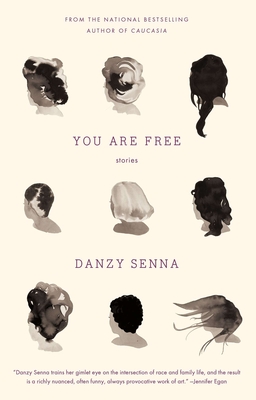
Danzy Senna’s collection of short stories, You Are Free, released by Riverhead Books earlier this year provides a window to a bevy of multiracial characters voyaging through an alleged post racial western world, “The election had come and gone, the blackish man was in charge, and the slogan on the bumper –Yes We Can—already had the feeling of some dusty, long-gone revolution.” Senna gives us her take on the multiracial experience in a cultural landscape that has become, in some ways, more level. Meet the Jeffersons. Meet the Cosbys, and the Obamas; forgoing the sass and patterned sweaters, and opting instead for strained marriages and relationships, women questioning their roles as mothers, and, for some, the angst of being middle to upper-middle class - an angle that is rarely portrayed with characters of color.
In the story What’s the Matter With Helga and Dave? A nameless narrator and her husband Hewitt hate the Cosbys for this very reason, “Hewitt and I both hated The Cosby Show with a venom and vigor –for its smugness, for the cloying sweetness of the vignettes pretending to be plots, for the surrealism of a rich black family who had no problem integrating into white America.” The narrator and her husband do not necessarily have a hard time integrating into their Los Angeles neighborhood. The are facing life as new parents and later dealing with the strange relationship that develops between Hewitt and their female neighbor, Helga. Race, in much of Senna’s stories, plays a supporting role to the main issues that her characters are dealing with.
In the Land of Beluah , probably the most disturbing story in this book, Jackie works at a temp agency where as the “lightest, brightest and whitest” (she is the product of a black father and white mother) she gets picked for jobs first; where, “Dark-skinned girls were always the last to go, no matter how fast their typing speed.” Jackie's break-up with her boyfriend Kip, who has left her because he claims she is not black enough for him, sets off something in her that can only be remedied through the abuse of Beluah, a stray dog that Jackie has taken in. Beluah, the bitch, as she is repeatedly referred to throughout the story, “The bitch was a mystery. She didn’t look mixed more like some breed that hadn’t yet been discovered,” becomes the manifestation of Jackie's self loathing.
In fact many of the women in these stories carry a degree of self-loathing while their male contemporaries are afforded the luxury of being light-hearted and without the same insecurities. While problematic, it is also understood that these stories are centered around female protagonists and the afflictions that effect women more so than men - though it would have been nice to read more self-assured female characters. You Are Free is a book definitely worth reading. Senna showcases how race is not exactly what it was or what it has been and is believed to be; especially as it pertains to people's lives, and how class and gender can be colored by it. Many of the characters are grappling to find comfort at having attained a certain echelon of social success, among other life's happenings and Senna conveys this through clear, funny and dark writing. She gifts us with complicated themes that should definitely be explored again and again.



No comments:
Post a Comment